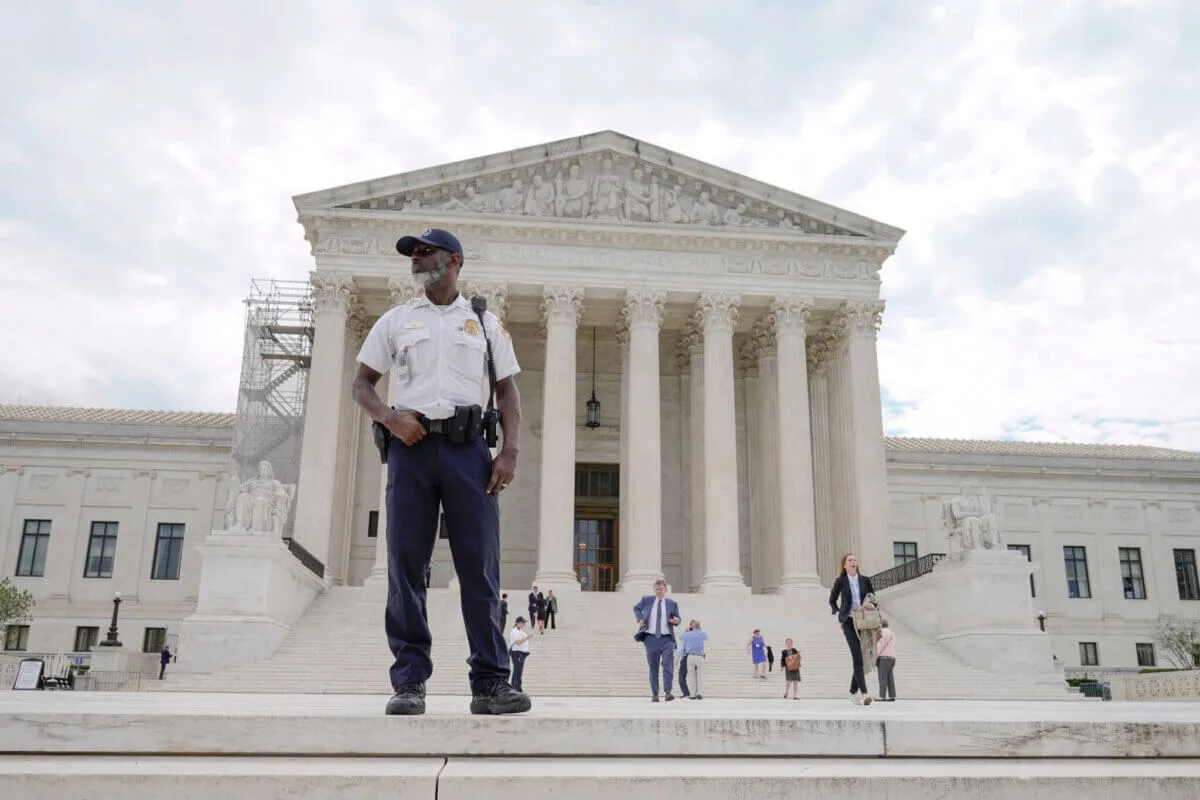
A police officer stands outside of the U.S Supreme Court, Tuesday, June 27, 2023, in Washington. (AP Photo/Mariam Zuhaib)
The Supreme Court has ended constitutional protections for abortion that had been in place for nearly 50 years in a decision by its conservative majority to overturn Roe v. Wade. Today’s outcome is expected to lead to abortion bans in roughly half the states.
In Arizona, women already faced harsh abortion restrictions—but now under this new ruling, abortion will be even worse.
We spoke to Dr. DeShawn Taylor, a board-certified OB/GYN, clinical professor, women’s health and reproductive rights advocate, and owner of Desert Star Family Planning in Phoenix, about what the Supreme Court ruling means for Arizonans.
Important to note:
- Abortion is still legal in Arizona for now, but the future is uncertain because of who is in charge in the state legislature and governor.
- Arizona already has an unenforced abortion ban that would go into effect if Roe v. Wade is overturned.
- Arizona has a history of enacting measures that make it extremely challenging to get abortion care. For example, a patient must receive state-directed counseling that includes information designed to discourage the patient from having an abortion, and then wait 24 hours before the procedure is provided.
- Arizona’s Republican Governor Doug Ducey signed a bill banning abortions after 15 weeks of pregnancy. The 15-week ban will likely kick in after the Supreme Court decision, with only an exception for medical emergencies, not rape or incest. Physicians who violate the law may be prosecuted for a felony and could have their licenses revoked if convicted.
- 1.6 million women of reproductive age in Arizona will be affected by an all-out ban, according to Guttmacher.
Copper Courier:
Now that Roe v. Wade has been overturned by the Supreme Court, will we see an immediate change in Arizona when it comes to abortion access?
Dr. DeShawn Taylor:
There are still some uncertainties there, but what I can say for sure is the decision day does not make abortion immediately illegal here in Arizona.
Copper Courier:
What will happen to clinics like yours if the old Arizona law is ultimately enforced and you’re banned from providing abortion care?
Dr. DeShawn Taylor:
Each of us independent providers would be significantly impacted by not being able to provide abortion care in this state, considering that it’s the majority of the care that we provide.
I do provide additional types of care, so my clinic specifically would not close. However, of course, if abortion is illegal in this state, then illegal abortions would not happen at my clinic. I do feel very strongly that there needs to be trusted medical professionals available to community members who have questions about how to navigate the process of obtaining care. And so the way that this old law was written, there are some questions around what abilities we do have as healthcare providers to assist people, and so those are some things that we really have to figure out once that time comes.
Copper Courier:
In that case, if someone needs an abortion, what do you suggest they do? Do you think they will have to travel to another state?
Dr. DeShawn Taylor:
Definitely, people who have the resources to travel to another state should definitely make every effort to do so. Each of the states surrounding us should still have abortion care legal. And I think honestly with all the restrictions that we have in Arizona, there are already people who have the means to do that already, to go to a neighboring state that doesn’t have the 24-hour wait, for example, that we have here.
Care is significantly more expensive in each of our bordering states as well, so it’s definitely going to be really important for people to know where to find financial assistance. So we have the Abortion Fund of Arizona, we have the National Abortion Federation, we have Indigenous Women Rising for indigenous people, and occasionally they do fund people who aren’t indigenous. And so understanding those networks of care is going to be important. There’s information online that will help people assist people in figuring out where they can find care as well.
We get to a place where, as healthcare providers, specifically physicians, our hands are tied because the pre-Roe law comes with criminal penalty, possible prosecution, and jail time, so that really puts us in a precarious position to try to assist people to obtain abortion care. [But] it’s not against the law for Arizonans to try to get abortion care, as we’ve seen in other states where people have been jailed for miscarriages. [Arizona] law does not say that that is something that should happen here. But I can see that people would understandably be afraid, because when you think that something is illegal, then you think automatically it comes with a criminal penalty, but that is not what we know to be the case at this moment in time. The criminal penalty does lie with the provider though, and so that really ties our hands.
Copper Courier:
So speaking of people sort of, taking this into their own hands, will the Plan B pill still be available? Some legal experts believe the overturning of Roe will lead to the banning of certain emergency contraceptives.
Dr. DeShawn Taylor:
Plan B is not an abortion pill. Plan B is a form of birth control, emergency birth control. Mifepristone and misoprostol are the two medications used to induce an abortion.
Mifepristone is generally required to be received from a healthcare institution. Misoprostol is more readily available on the internet and in other ways that people can get them. There are some opportunities that are sprouting up where people are trying to figure out how to deliver care across state lines. Those things are still being worked out. There is a lot of complexity around that. I know that I as someone who has an Arizona license would not necessarily be able to, even if I had another license while I’m physically in Arizona, I wouldn’t be able to maybe do a telehealth visit with someone in Nevada if I had a Nevada license, because here in Arizona, telehealth is banned for the use of, for medical abortion. So our state legislature over the years has really entrenched us in a difficult position without Roe v. Wade being available to us to be able to continue to provide care here.
Copper Courier:
If people get that medication to get an abortion, there’s no legal issue that they’re facing if they buy it online and do the procedure at home?
Dr. DeShawn Taylor:
Based on my understanding of the law that would be enforced is that the criminal penalty for pregnant people trying to get abortion care was removed. Last year our governor signed a bill into law, SB1457, and a lot of the reporting about that was about reason bans: people not being able to have abortions for fetal abnormalities or genetic diagnoses. That was held up in court. Well, a piece of that that was not well known was that that law also repealed the portion of the old law on the books that would make it criminal for a pregnant person to try to obtain an abortion, so that has lifted the criminal penalty from the person who is pregnant who is trying to get abortion care. So at this moment in time … there is not a law that would give anyone the legal means to try to incarcerate or prosecute someone.
Now, having said that, we don’t know that [lawmakers] wouldn’t try, so I could definitely understand that there would be a great deal of fear and concern. What I want people to know … [is that] my clinic will still be here—although not providing abortion—[as] a safe place [for] information.
Important to note:
Arizona law makes it illegal to deliver any abortion-inducing drugs but the medication itself can be prescribed.
Copper Courier:
Can you talk a little bit about the risks of medication abortion at home?
Dr. DeShawn Taylor:
The good news is that someone trying to self-manage their abortion in 2022 is very different than what was available to people before 1973. Abortion pills are safe and generally effective. The concern really comes into play… if someone is bleeding very heavily and for a very long time. That then puts them at risk of injury in terms of severe blood loss and potentially death as it relates to that. So it’s really important that people feel comfortable presenting for care when that’s happening. I think that in terms of a major, major complication or disability from the abortion pills, that’s just not something that we see.
The only other concern of mine would be that someone is attempting this a lot further along in pregnancy, where there is more of a potential that the entire pregnancy may not pass on its own. And again, that really sets people up for the possibility of hemorrhage and severe blood loss, which if untreated could cause death. What makes this more unsafe is the … possibility that people wouldn’t feel comfortable seeking care when they realize the process isn’t going exactly the way it should.
Copper Courier:
Is it true that in vitro fertilization (IVF) could be affected by the Supreme Court decision?
Dr. DeShawn Taylor:
Well, there is this [Arizona] law that is currently on the books of fetal personhood [which refers to the idea that every fertalized egg should have the same legal protections as a person], and that was signed into law last year along with that SB1457. And so there was a lot of question around, what does that mean? There was specifically a carve-out in homicide law for abortion, so we feel like probably someone wouldn’t be prosecuted under the fetal personhood for that, but there’s a lot of question around what does it mean for an embryo or a fetus to have personhood? Because that does have implications for in vitro fertilization. What do you do with those embryos that you don’t implant?
I think the other concern is when in vitro fertilization happens but the pregnancy doesn’t grow normally, and then people need a procedure which is a D&C, which is the very same surgical procedure that’s done for an abortion. And so would there be providers comfortable providing that care when there’s a concern that they could be criminalized for doing an abortion. So that I think is the other side of it in terms of a provider’s comfort level in providing procedures like that for miscarriages, for an in vitro fertilization that didn’t take correctly. It becomes an issue for all types of pregnancies, not just people who have pregnancies that they’re wanting to terminate because it’s just not the right time to be pregnant. It really creates a hostile environment for all pregnancies.
Copper Courier:
Anything else you think is important to share?
Dr. DeShawn Taylor:
I do want to just help people to really think about the election coming up in November 2022, and historically turnout for these midterm elections has been very low, and this is how these extreme lawmakers stay in office. These people do not represent the opinions of the majority of Arizonans, but they’re able to push through these harmful policies because it’s during these times that they’re up for reelection and people don’t show up to the polls.
Looking for the latest Arizona news? Sign up for our FREE daily newsletter.

Phoenix Mercury star Brittney Griner details Russian prison ordeal in book
WNBA star Brittney Griner said her days of playing basketball overseas during the WNBA offseason are over. Brittney Griner continues her efforts to...

After Barstool Sports sponsorship fizzles, Snoop Dogg brand is attached to Arizona Bowl, fo shizzle
TUCSON, Ariz. (AP) — Snoop Dogg is putting his name on the Arizona Bowl for what will be the first partnership between an alcohol brand and a...

The 7 best public high schools in Arizona
Parents searching for top-ranked public high schools in Arizona to send their children to have options. Using scores from US News & World Report...

VIDEO: Phoenix and Flagstaff will use new electric buses
@coppercourier School districts aren't the only places getting electric buses. Did you know Phoenix and Flagstaff have also rolled out electric...





